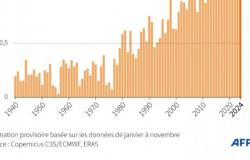The measure already recommended by the WHO, and already adopted by more than 80 countries, aims to prevent congenital malformations in newborns.
Published on 19/12/2024 14:20
Updated on 19/12/2024 14:22
Reading time: 2min

Anything new in supermarket flours? In an opinion published Thursday, December 19, the National Agency for Food, Environmental and Occupational Health Safety (ANSES) recommends a “systematic enrichment of the diet with folic acid” white and wholemeal flours to improve vitamin B9 intake.
Clearly, wheat flours in France must be enriched with folic acid, the synthetic form of vitamin B9, as they are in several dozen countries, in order to prevent congenital malformations in newborns, estimates ANSES. .
The cause: insufficient intake of vitamin B9 in pregnant women, which constitutes one of the main risk factors for neural tube defects (NFTN), congenital malformations which can have very serious consequences on the development of the brain and spinal cord of the newborn.
A WHO resolution is already encouraging States to enrich foods with vitamin B9, often via flours, sometimes directly in cereal products, in order to prevent these malformations. More than 80 countries around the world have already adopted this recommendation in recent years.
In France a prescription for folates, hasanother name for folic acid, is currently recommended for women wishing to become mothers: it must in principle begin at least eight weeks before conception and continue during the first trimester of pregnancy. However, according to the 2021 National Perinatal Survey, less than a third of women report having started vitamin B9 supplementation before their pregnancy, as recommended. Folate in its natural state is mainly found in green vegetables, citrus fruits, eggs and cheeses.








